The INTJ
INTJs are the intellectual, quick-thinking masterminds of the Myers-Briggs® world. Known for their strategic prowess and powerful insights, they live with a constant thirst for knowledge and discovery. They rely on their dominant function, Introverted Intuition (Ni) to see hidden patterns and meanings for the future. They have extremely accurate and astute perceptions about how various plans and concepts could develop over time. INTJ personality types also use Extraverted Thinking (Te) to form efficient, strategic plans, create new theories, and organize their world in a logical way.
The INTJ personality type is extremely rare, making up only 1.5% of the US population. Most people who get this type on the Myers-Briggs Type Indicator (MBTI®) feel a bit of relief as they start to see why they’ve felt a bit like “misfits” in the world.
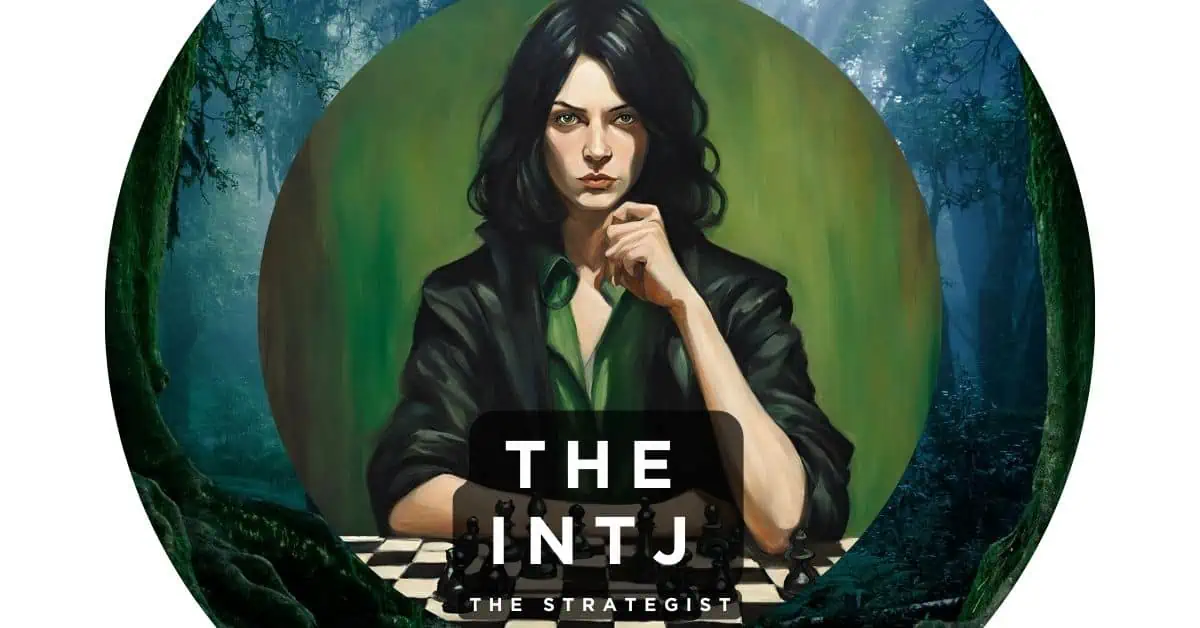
Want to find out if you’re an INTJ personality type? Take our questionnaire to discover your four-letter type code!
Estimated reading time: 1 minute
What Does INTJ Stand For?
I = Introversion. “I focus inwards before outwards, analyzing what things mean to me before responding to the environment.”
N = iNtuition. “I focus more on the abstract or potential of something than the concrete or existing reality.”
T = Thinking. “I like to decide things by looking at the logic of the choices available. I mentally step away from a situation so that I can examine the pros and cons objectively without getting emotionally biased.”
J = Judgment. “I like having things settled, decided and structured. I am typically a work-before-play person.”
INTJ Motivations and Weaknesses:
- Driving Force: To understand the “dance of the universe.” To see the underlying meaning of all things.
- Backup Strength: Understanding of how to organize and structure the outside world to achieve objectives. An eye for logical organization and analysis.
- Weaknesses: Can lose track of details by focusing so much on the abstract. May become out of touch with reality or panic when having to deal with a lot of details unexpectedly.
- Stressors: Lack of alone time, over-stimulation, navigating unfamiliar places, dealing with irrational people, multi-tasking, focusing on nitty-gritty details.
INTJ Characteristics:
While people vary based on their background and even their Enneagram type, people with INTJ preferences often have the following characteristics:
- Independent and crave autonomy
- Intellectually curious
- Intuitive and insightful
- Skilled at predicting how things will play out in the future
- Believe in truth over tact
- Focus on the future more than the present
- Big-picture thinkers
- Enjoy exploring concepts, theories, and predictions
- Stay with complex problems longer than other types
- Prone to perfectionism
- Read-between-the-lines
- Prefer having a plan and tend to get frustrated by surprises
INTJ Career Paths:
INTJs need a career that allows them to be creative, independent, and original. When they have these opportunities, they can approach nearly any task with self-confidence. Anything run of the mill will make them feel uninspired and bored. In fact, they’d happily forego job security if it meant that they could achieve higher goals or work at something intellectually challenging. They enjoy being innovative and improving existing systems by logically organizing them to be more effective. Working in an organization that has a clear structure, along with room for creativity and autonomy, is deal. They also demand fairness in the workplace; preferential treatment and emotional manipulation are to be strictly avoided.
Here are some careers that INTJs tend to excel at:
- Strategist
- Cybersecurity specialist
- Scientist
- Lawyer
- Mathematician
- Anthropologist
- Microbiologist
- Architect
- Nuclear engineer
- Entrepreneur
- Attorney
- Inventor
- Artist
- Philosopher
- Writer
- Professor
Famous INTJs:
It’s always difficult to type famous people or celebrities because I can’t exactly sit across from them and conduct a thorough profiling session. But to the best of my knowledge, the following people have INTJ type preferences:
- Isaac Newton
- Ayn Rand
- Friedrich Nietzsche
- Mark Zuckerberg
- Bobby Fischer
- Nikola Tesla
- Stephen Hawking
- John Adams
- Isaac Asimov
- Christopher Hitchens
- Martin Luther
- G.W.F. Hegel
- James Cameron
- Jodie Foster
- Annie Clark
- Russell Crowe
- Patrick Stewart
How Rare Are INTJs?
INTJs are the fourth-rarest Myers-Briggs® personality type, making up a mere 2.6% of the national population (MBTI® Manual – Fourth Edition).
INTJ Cognitive Functions
The Dominant Function: Introverted Intuition (Ni)
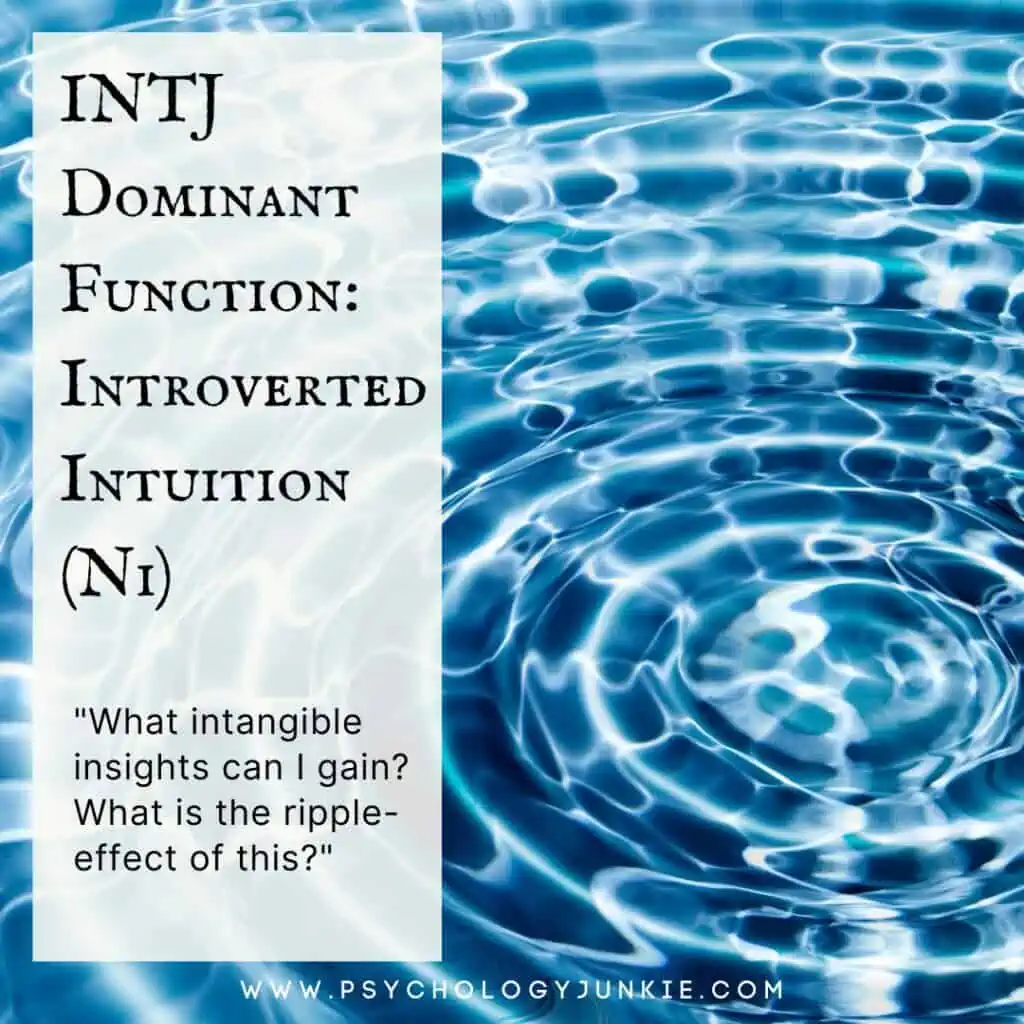
Because the INTJ’s intuition is introverted in direction, it may not seem highly visible to the outer world. However, it’s constantly running in the background of their mind. Ni rapidly shifts perspectives and sorts through information to find one truth or prediction about the future. The INTJ asks themselves, as Carl Jung wrote, “What does this mean for me or the world? What emerges from this vision in the way of a duty or a task, for me or the world?”
As a child, Ni will develop and progress faster than any of the other cognitive functions for INTJs. The young INTJ might be preoccupied with existential questions, questions about reality, where life began, and the significance of all living things. They might find themselves absorbed in books on philosophy, science, or even poetry. For them, an integral part of life is the attempt to understand it, find meaning in it, and to question pre-established conventions. Unsurprisingly, INTJs often seems more grown-up than their peers, and they can find the normal playthings and concerns of others as somewhat trivial or shallow. They can also be perfectionists, trying to create projects and plans that align with an impossible vision or standard.
As the INTJ grows and develops they will become more proficient at using their Intuition to make projections into the future. They will have flashes of insight that lead them, and they get a thrill from mapping out their future and anticipating what will come to pass in the days ahead. The theoretical, the unknown, the “big picture” meaning of life is their ultimate interest.
The Auxiliary Function Extraverted Thinking (Te)
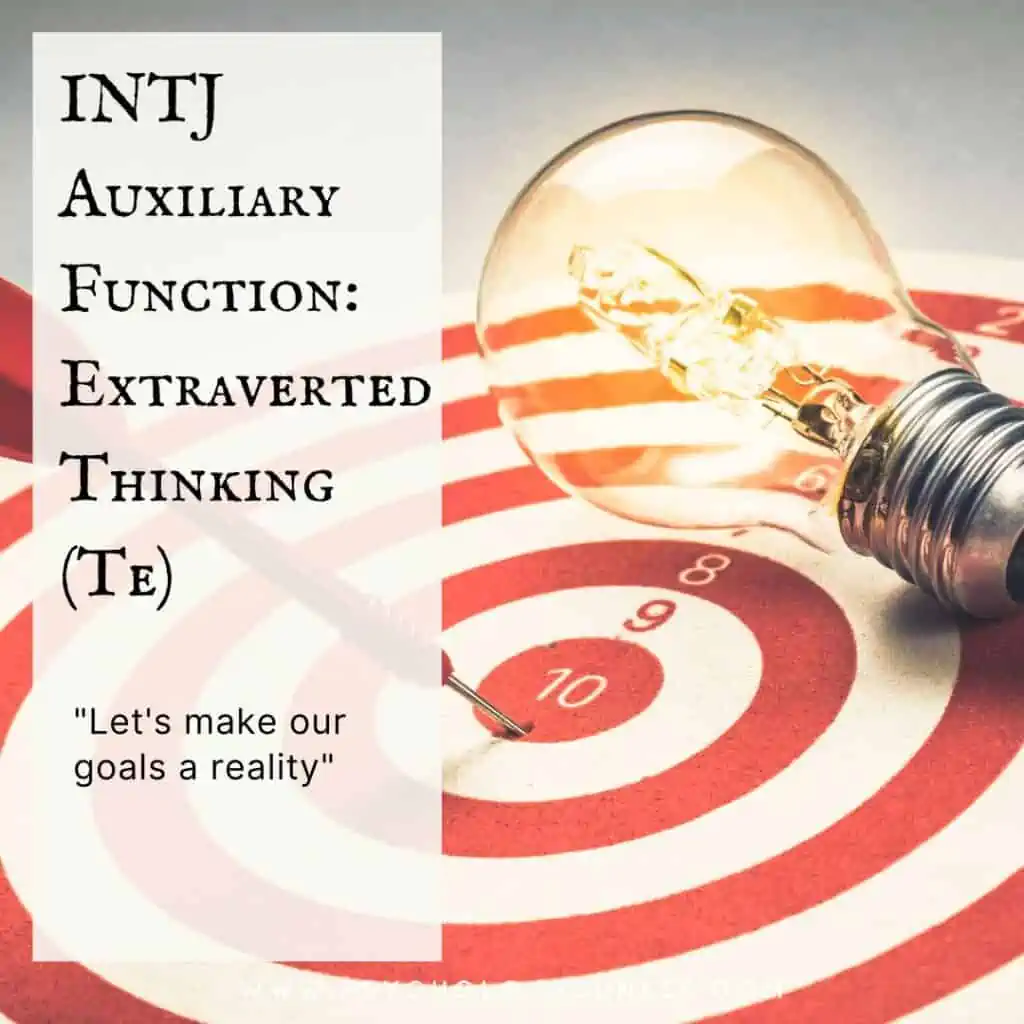
Extraverted Thinking (Te) supports Ni and promotes growth and development. While it’s not the #1 favorite function of the INTJ, it is still one that they wields with great mastery (unless they are unhealthy, imbalanced, or under stress).
Extraverted Thinking is concerned with organizing, creating systems, planning, and enforcing. It is highly logical and is focused on taking in enough information to make a decision or to create a plan. Because INTJs combine pattern-recognition and logical foresight, it can make them daunting foes when it comes to strategic plans or games. In fact, these types are often considered the most challenging chess players because of their way of understanding how to direct to reach an end goal. Bobby Fischer himself is considered by most typologists to be an INTJ.
Te gives INTJs a drive to bring their inner insights out into the world in a productive, tangible way. They aren’t merely content to learn “for the sake of learning.” They wants to learn to create something. To the outer eye, INTJs may at times seem more like ENTJs because they can be very confident, directive, and outspoken in pursuit of their goals. They may not fit the stereotypical image of a hermit introvert who is quiet and prefers to be in the background.
“Let the future tell the truth, and evaluate each one according to his work and accomplishments. The present is theirs; the future, for which I have really worked, is mine.”
– Nikola Tesla
The Tertiary Function: Introverted Feeling (Fi)
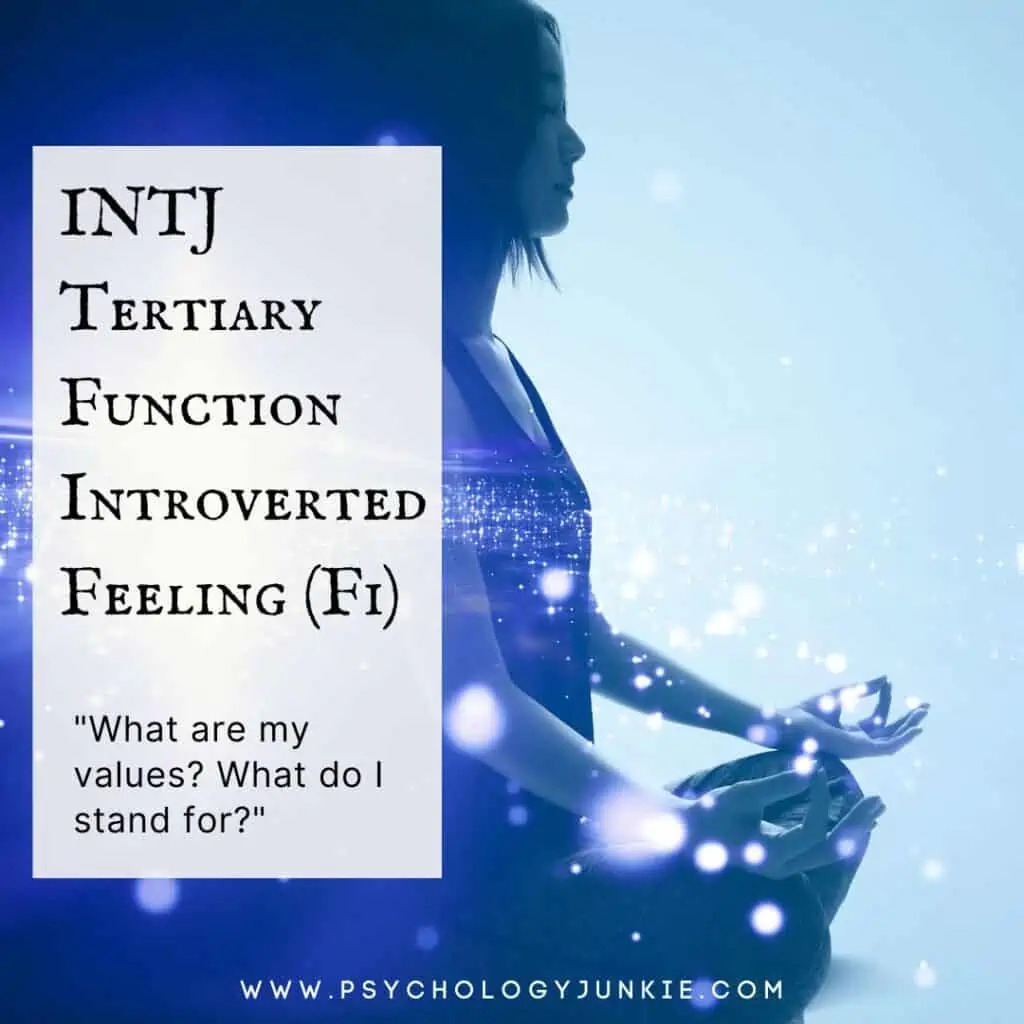
The INTJ will normally prefer the world of thinking over the world of feeling. However, Fi gives INTJs an unshakeable set of core values that they rely on and trust. They will ask themselves, “does this align with what I believe is right? Am I being true to myself?” Fi helps INTJs to prioritize their goals according to their conscience and it gives them an individualistic sense of identity. They don’t want to be like everyone else. Being conformist or following the crowd will rarely hold any appeal. INTJs can be very in touch with their emotions and feelings, although private and reserved about sharing them.
Some INTJs use their Fi, Te Ni together to promote a vision that will help humanity in some way. They can be activists for change or great humanitarians. The stereotypical “cold, heartless” INTJ is actually a very far cry from the true INTJ. Though they may not express their emotions out loud, they usually have a deep set of values and care deeply for a select group of people.
When it comes to decision making, INTJs will almost always use Thinking over Feeling. They will try to be as impersonal and unbiased as possible. While they may have personal feelings about a decision, they don’t feel a compulsion to share them unless it’s absolutely necessary. To the outside world, the INTJ may seem especially blunt, directive, and straightforward. This doesn’t mean that they have no concern or empathy for the human component of a decision.
The Inferior Function: Extraverted Sensing (Se)
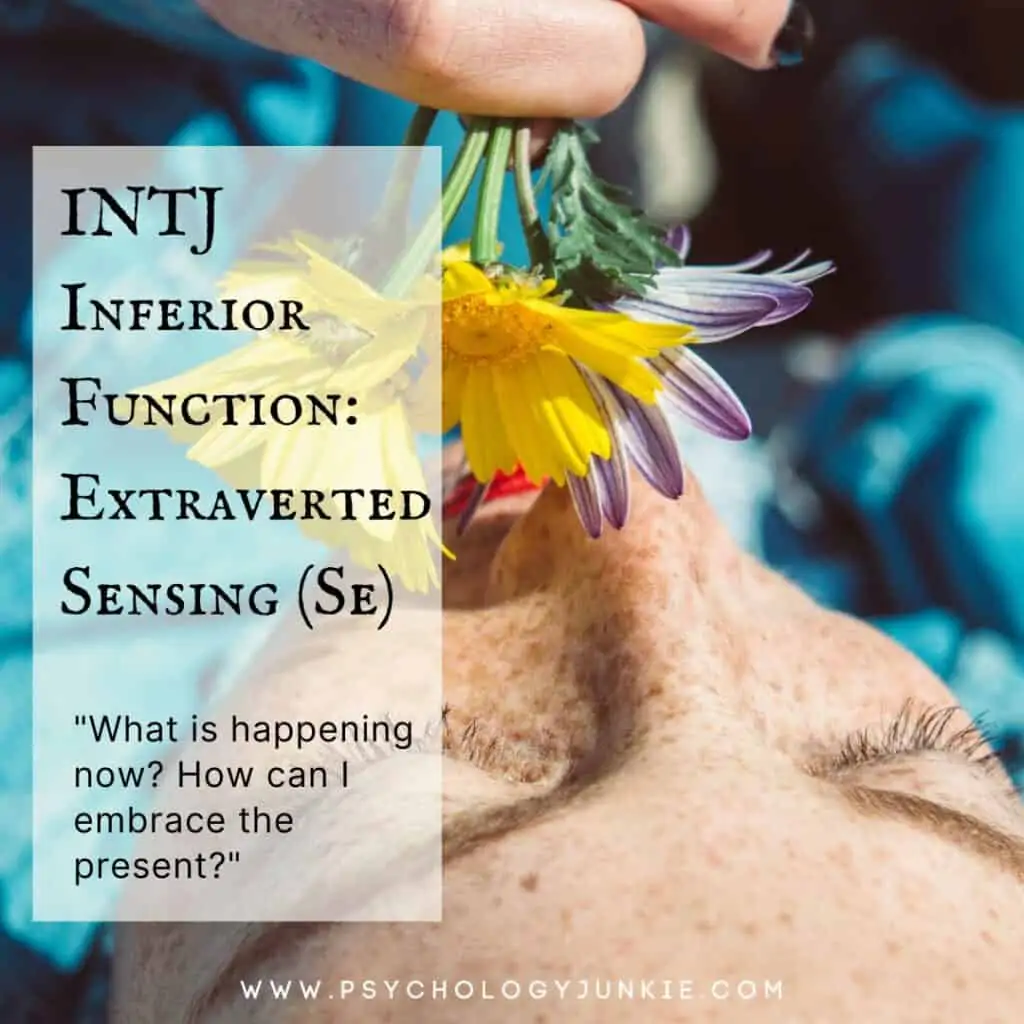
The inferior function is one that each personality struggles with in day-to-day life, yet it also provides balance. INTJs without access to their inferior Sensing function become ungrounded, unrealistic, and less effective. Thus, Intuition and Sensing are dependent on each other in powerful ways. INTJs often feel a push and pull between despising their Sensing side and desiring it. Because they have inferior Se, they can struggle with fully being present in the moment. They may focus so heavily on the future and the big picture that they lose sight of what’s happening in the immediate context. Sensory details might get missed or they may de-prioritize tasks that they see as mundane or trivial. They can feel on edge in over-stimulating environments or when navigating new, unfamiliar places.
At the same time, Se is somehow compelling to the INTJ. It’s a part of them that is often repressed in favor of their Intuition. There are times when they will go from being “stuck in their head” to impulsively taking on a physical challenge. They may go from being a bookworm to a restless thrill-seeker. In healthy ways Se can show up in an inclination to try new foods, exercise, or engage in recreational pursuits. INTJs may also experience Se in unhealthy ways; by over-eating, over-exercising, or making impulsive, risky decisions.
When INTJs repress Se for too long, they risk having a “grip” stress reaction. If they wear out their dominant function (Ni) and fall into Se, they can become suddenly impulsive, short-sighted, or focused on sensory pleasure. These episodes may be extremely short-lived or chronic. Usually, they are relatively short-lived and only appear during cases of extreme stress.
INTJ Strengths:
Balanced INTJs are visionary, strategic, and influential. Above all, they yearn to realize their vision and to see it become a reality. In decisions, they are logical and straightforward, and in their relationships they are focused on authenticity and fairness. They are true to their word and dependable, but they have a restless streak that can make them surprisingly daring and adventurous at times.
INTJs are far from the stereotypes you’ve probably heard about them. Yes, they are likely to be logical and ingenious. No, they don’t lack feelings or empathy. In fact, they have a gift for perspective-shifting and can often put themselves in others’ shoes easily. They are visionary and future-focused, but they can have moments of extreme pleasure enjoying the present moment in all its fullness. As introverts they cherish their alone time, but they can also talk for great lengths about subjects that interest them. While they are often drawn to the fields of science, politics, and technology that doesn’t mean they aren’t philosophers (Nietzche), authors (Isaac Asimov), theologians (Martin Luther), or performers (Russell Crowe).
INTJ Weaknesses:
INTJs, like all personality types, have their own set of weaknesses that can sometimes interfere with their relationships, their work, and their personal growth. Let’s take a look:
- Overly Perfectionistic: INTJs have high standards for themselves and won’t stop until they achieve their vision or plan. But sometimes this means they are never happy until their work matches their “perfect” idea.
- Critical and Insensitive: An INTJ might inadvertently hurt someone’s feelings by criticizing their ideas or work without carefully considering the impact of their words.
- Tunnel-vision in Pursuit of Vision: When an INTJ has a vision or goal, they can sometimes develop tunnel vision, focusing so intensely on their goal that they ignore other potential opportunities or risks.
- Oblivious to Details and Reality: The INTJs focus on abstract concepts and big-picture thinking can sometimes make them oblivious to the finer details or realities of a situation.
- Judgmental of Different Personality Types: INTJs may find themselves baffled by the emotional intensity of Feeling types, or they may find Sensing types overly narrow in their views, without seeing the benefits of these other perspectives.
- Overly Impulsive During Times of Intense Stress: During times of intense stress, INTJs might act impulsively. A normally reserved INTJ may make a hasty decision during a crisis, later regretting the lack of consideration.
Understanding these weaknesses can provide INTJs with a clearer path towards personal development and self-awareness. By actively working to mitigate these weaknesses, INTJs can create more meaningful relationships and achieve their goals more effectively.
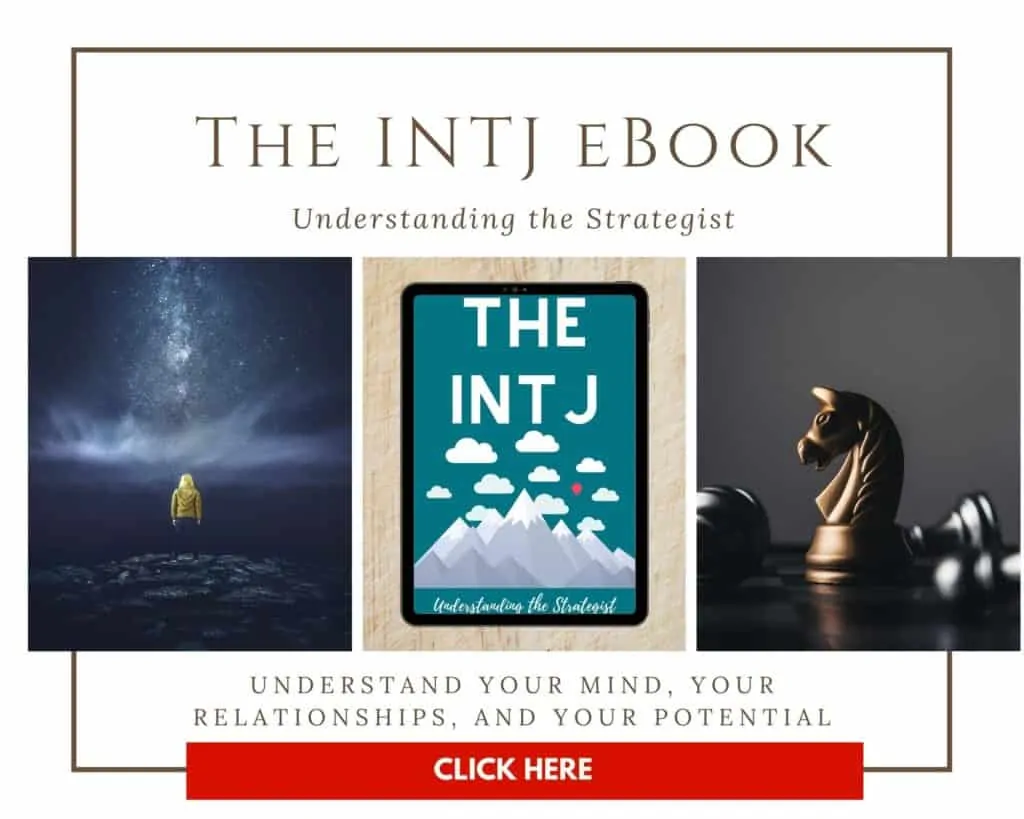
Important Resources for INTJs:
24 Signs That You’re an INTJ, the Strategist Personality Type
10 Things You Should Never Say to an INTJ
When INTJs Loop – Understanding the Ni-Fi Loop
The Top 7 Gift Ideas for INTJs
The Childhood Struggles of INTJs
The Underrated Kindness of the INTJ Personality Type
12 Stress-Busting Techniques for INTJs
The Shadow Functions of the INTJ Personality Type
12 Amazing Fictional INTJ Characters
Subscribe to Our Newsletter

Want to discover more about personality type? Get the inside scoop with Susan Storm on all things typological, along with special subscriber freebies, and discounts on new eBooks and courses! Join our newsletter today!

